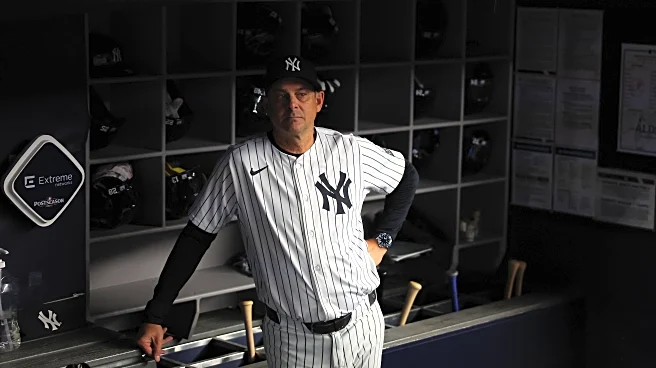Eight years in, it’s difficult to evaluate the performance of one Aaron Boone. For most managers, though the task isn’t exactly easy, there are at least a few questions that help us get at the quality
of the job done: How is the manager regarded by his players? Does the team stay steady when adversity hits, or does the locker room descend into scandal? How is his tactical acumen? And, most critical, does he win ballgames?
After nearly a decade at the helm of the Yankees, it’s clear that the matter of grading Boone goes far beyond the typical rubric. That largely stems from the fact that, well, he fares pretty well by the rubric. Boone is one of the winningest managers in history, his players consistently have his back through thick and thin, and despite managing in the boiling cauldron of the New York sports landscape, the Yankees have seldom found themselves embroiled in the kind of internecine scandals that can plague other franchises when the going gets tough. And, however frustrated fans may be by Boone’s tactics, it takes only a cursory glance around the league to find that most managers have their own share of strategic peccadilloes (see, for instance, how Dave Roberts, the most accomplished skipper working in the league these days, fared in trying to close out Game 2 of the NLDS in Philadelphia).
No, there’s no straightforward report card for Boone. Rather than a grade, Boone’s tenure is instead defined by a story, one that has repeated for nearly every year of his tenure. Every season, the Yankees look strong on paper, they win a bunch of games, and then they lose in the playoffs.
That story, the story that’s played from spring training to October for nearly a decade now, highlights the contradiction that plagues the modern Yankees and makes it almost impossible to evaluate their manager. The Yankees, the most successful franchise in the history of American sports, tout the World Series or Bust mantra, parroted by their team captain, whether it was Derek Jeter or Aaron Judge, for decades.
The contradiction arises because they do not believe in the mantra. If they believed it, Boone would have been fired years ago. They haven’t fired him, because they know that their motto is an anachronism that cannot be adhered to. Thanks to any number of field-leveling forces (say, more stringent luxury tax penalties that make it more onerous to outspend opponents, Hal Steinbrenner’s tepid commitment to outspending said opponents, a bloated playoff tournament that blunts the chances of even top teams from winning the whole thing), Championship or Bust is an outdated modality. The Yankees understand that, and will refuse to overreact if and when things go sideways in October as long as the underpinnings of the team (large-sample success in the regular season) remain solid.
So what do we do then? If the Yankees play by a different set of rules that renders meaningless the usual rubric for grading a major league manager, but also don’t adhere to their own number-one rule, what do we do with Boone?
The simplest thing, and what I suspect the Yankees will do, is keep plugging along. For all the lows of the 2025 season, it came with undeniable highs, and it’s easy to forget the context of this campaign. After losing Juan Soto to the Mets and Gerrit Cole to injury, the Yankees were not supposed to lead the AL in wins. They were supposed to fall closer to the middle of the pack, with a win total in the mid-t0-upper 80’s looking like a reasonable expectation. In virtually any other market, this kind of managerial job, regardless of the details, would be a rousing success, and there would be little controversy surrounding the status of the person in charge.
That’s not what most Yankees fans want to hear, of course, and though I disagree with many on whether Boone is a huge problem (again, see the lack of clubhouse discord in a brutal market, the way his players vouch for him, and, ultimately, the sparkling win-loss record), at this point, it’s also hard to argue against a change, even just for change’s sake. Even if Boone’s time in the Bronx has been largely successful when you zoom out, when the story stays the same and the message gets stale is when moving on starts to make more sense.
If the Yankees were an unstable franchise searching for a shred of continuity, moving on from a manager after a season like this would seem folly. But the Yankees are not an unstable franchise, and they themselves, in hiring Boone eight years ago, demonstrated the potential benefits of taking a swing and making a change at the risk of rocking the boat. When New York kicked out Joe Girardi in 2017, they were coming off their most successful season under Girardi in years, Girardi himself the leader of their last title team and in possession of an excellent overall record. The Yankees opted to proactively seek an upgrade on the safe, known quantity that was Girardi and to go boldly in a different direction, hiring a rookie manager who they thought carried higher upside.
Fast forward to 2025, and it’s Boone who’s the safe option, the unknown that carries the higher upside. In my view, it would be almost unfair to fire Boone now, just as it was unfair to fire Girardi after such a successful season. But Meg Rowley put it well on Effectively Wild last week when she said, “One of the professional responsibilities of managers is to get fired.” It doesn’t mean it’s fair, or follows a coherent line of reasoning. Falling on your sword is just part of the gig.
At this point, nothing the Yankees do is likely to feel that satisfying to fans, short of firing everyone in charge and then immediately winning it all. Boone by any objective measure did a good job this year, but also failed to tell any story different than the one he’s told for eight years. The Yankees don’t want to risk shaking things up too much with a team that’s soclose, but risk staying ever stagnant if they don’t. There is no easy evaluation to make of Boone, or the Yankees as a whole in 2025. They are great, they are frustrating, they have everything they need to win the World Series, and they never do.











